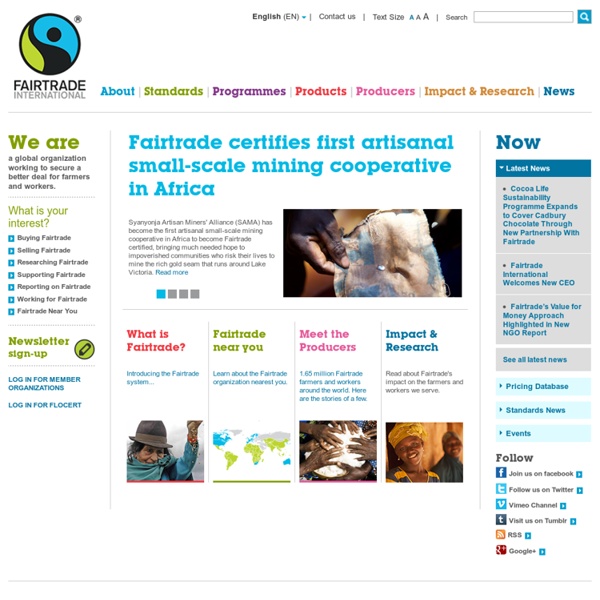



Fairtrade certification In 2009, Fairtrade certified sales amounted to approximately €3.4 billion (US $4.9 billion) worldwide, a 15% increase from 2008.[2] Sales are further expected to grow significantly in the coming years: according to the 2005 Just-Food Global Market Review, Fairtrade sales should reach US$ 9 billion in 2012 and US$ 20-25 billion by 2020.[3] The Fairtrade industry does not reveal how much of this is extra profit to retailers and distributors in rich countries, how much is spent on Fairtrade’s own costs or how much reaches the farmer. As of 2011, 827 producer organizations in 58 developing countries were Fairtrade certified.[2] How it works[edit] With Fairtrade coffee, and for instance, packers in developed countries pay a fee to The Fairtrade Foundation for the right to use the brand and logo, and nearly all the fee goes on marketing. Fairtrade Standards[edit] A T-shirt made from Fairtrade certified cotton. Fairtrade pricing[edit] Fairtrade inspection and certification[edit] History[edit]
Der Blaue Engel | Gesund leben mit dem Blauen Engel Site national des AMAP ifoam.org | International Federation of Organic Agriculture Movements Organisation for Economic Co-operation and Development Fair Trade Certified Coffee What is fair trade certification? Much like organic certification, fair trade certification lets you know about the origin of a product. Fair trade certified products come from all over the world, but share a common history. Farmers who grow fair trade products receive a fair price, and their communities and the environment benefit as well. Fair trade certified coffee directly supports a better life for farming families in the developing world through fair prices, community development and environmental stewardship. Fair trade farmers market their own harvests through direct, long-term contracts with international buyers, learning how to manage their businesses and compete in the global marketplace. The Fair for Life label guarantees: Fair price: Family farmers receive fair prices for their harvest, and premiums specifically earmarked for community development projects; even higher premiums are given for certified organic products. Examples of community projects include:
Deutsch Accueil - © la Plate-Forme pour le Commerce Équitable IFC Fair Trade: What is Fair Trade? What is Fair Trade? Fair Trade is a system of exchange that honors producers, communities, consumers, and the environment. It is a model for the global economy rooted in people-to-people connections, justice, and sustainability. A Fair Price for Products For Fair Trade Certified™ products, a base price for the commodity is set by the international Fair Trade Labeling Organization. cover the cost of production and a living wage to cover the basics of food, shelter, clothing, education, and medical care. Investment in People and Communities Many Fair Trade producer cooperatives and artisan collectives reinvest their revenues into strengthening their businesses and their communities. Environmental Sustainability Fair Trade farmers and artisans respect the natural habitat and are encouraged to engage in sustainable production methods. Direct Trade Fair Labor Conditions Workers are guaranteed freedom of association and safe working conditions. Promote Fair Trade in your community!
fair feels good: Fairer Handel Weiterführende Informationen Aktuelles 1.November 2007 Vollmilchschokolade mit Vollrohrzuckergeschmack trotz Abwertung bei Stiftung Warentest eine Qualitätsschokoladeweiter .. 27.Oktober 2007 "Geschmackstest" Schokoladeweiter .. Immer auf dem Laufenden bleiben Sie mit dem Newsletter. Statements von Prominenten Hier finden Sie Statements zum Fairen Handel von vielen Prominenten Unterstützern der Kampagne fair feels good. Zur Übersicht z.B. "Ich engagiere mich für ,fair feels good.‘, weil die Kampagne... weiterlesen .. Aktionen Seit dem Start von fair feels good. 2003 haben wir mit vielen Aktionen auf die Vorteile von Produkten aus Fairem Handel hingewiesen. Übersicht der Aktionen .. Hinweis Materialien Alle Materialien werden - so lange der Vorrat reicht - kostenlos abgegeben. weiter .. Fairer Handel Ich will´s anders! Konsum gegen Armut Der Faire Handel ist wirkungsvolle Entwicklungszusammenarbeit. Unser Online-Spiel
Quel est le meilleur label du commerce équitable ? La grille d'analyse élaborée par la Plate-Forme pour le Commerce Équitable reprend les trois piliers du commerce équitable (dimensions commerciale, éducative et politique) et se décline selon les critères suivants : 1) Critères économiques : prix équitable, prime de développement, préfinancement, traçabilité, etc. ; 2) Critères sociaux : respect des 11 conventions fondamentales de l'OIT, bénéfices sociaux complémentaires ; 3) Autonomie des producteurs et renforcement des organisations de producteurs : appui technique, priorité aux petits producteurs, renforcement des capacités commerciales, etc. ; 4) Critères environnementaux : gestion des sols, du transport, etc. ; 5) Critères de sensibilisation et d'éducation : activité de sensibilisation par le porteur de label. 1er : Naturland Fair Si l'on en croit l'analyse de la Plate-Forme pour le Commerce Équitable, le label Naturland Fair est le plus "équitable". Ce label a été créé en 2010 par l'association internationale Naturland.
World Competitiveness Yearbook (WCY) The IMD World Competitiveness Center (WCC) has been a pioneer in the field of competitiveness of nations and enterprises for the past 25 years. We are dedicated to the advancement of knowledge on world competitiveness by gathering the latest and most relevant data on the subject and by publishing an annual ranking of countries. IMD World Competitiveness Yearbook The IMD World Competitiveness Yearbook (WCY) is reputed as being the worldwide reference point on the competitiveness of nations, ranking and analyzing how an economy manages the totality of its resources and competencies to increase the prosperity of its population. It has been published since 1989 and compares the competitiveness of 60 nations on the basis of over 300 criteria. It is based on hard data statistics (2/3) and a business executives' opinion survey (1/3). The WCY is considered an invaluable research tool for benchmarking competitiveness performance, used by: IMD World Competitiveness customized projects